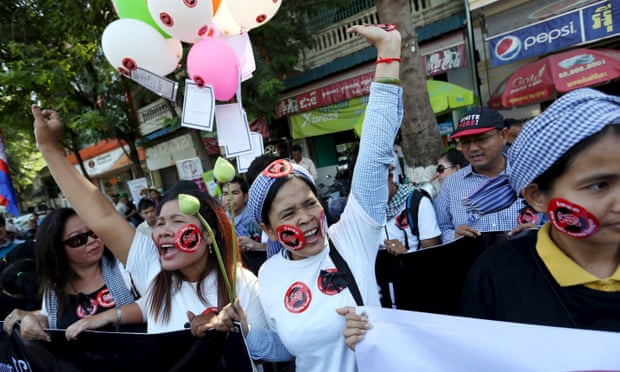Global crackdown on Human Rights groups incl. Cambodia
-
Anchor Moy
- Expatriate
- Posts: 13458
- Joined: Wed May 28, 2014 11:37 pm
- Reputation: 3974

Global crackdown on Human Rights groups incl. Cambodia
Laws affecting funding, requiring registration and prohibiting protest are among controls that are making it difficult for NGOs and other campaign groups

The crackdown in Cambodia is part of a wider trend in restrictions say human rights monitors, but a lot of reasons given here seem to apply to Cambodia :Human rights organisations and campaign groups are facing their biggest crackdown in a generation as a wave of countries pass restrictive laws and curtail activity. Almost half the world’s states have implemented controls that affect tens of thousands of organisations across the globe.
Over the past three years, more than 60 countries have passed or drafted laws that curtail the activity of non-governmental and civil society organisations. Ninety-six countries have taken steps to inhibit NGOs from operating at full capacity, in what the Carnegie Endowment calls a “viral-like spread of new laws” under which international aid groups and their local partners are vilified, harassed, closed down and sometimes expelled...
...
• Cambodia A new law requires registration and annual reports to be filed with the government. NGOs can be disbanded if their activities “jeopardise peace, stability and public order or harm the national security, national unity, culture and traditions of Cambodian society”...
...
...
The causes of increasing restrictions are complex, say organisations that monitor civil society activity, but broadly fall into three categories.
First is the shift in political power away from the west, the main source of funding for domestic civil society groups and the base for most big international NGOs. At the end of the cold war, the US and other western countries stepped in to assist newly democratising countries and burgeoning grassroots organisations.
But, more recently, many governments in the developing and post-communist world have pushed back against what they see as western interference. “This is the end of the post-cold war period in which [the west] felt that liberal democracy and western concepts of human rights were spreading around the world, to a period in which there’s a relativisation of political values and the questioning of a common narrative,” says Carothers.
Second, governments have woken up to the power of civil society – particularly after pro-democracy uprisings in former communist states and the revolutionary wave that swept through the Middle East.
“In most countries where leaders don’t allow a lot of pluralism or democracy, they’ve learned to tame opposition political parties,” Carothers says. “But the deepest fear of repressive governments is that they wake up in the morning, open the shutters of the presidential palace, and look out to find 100,000 citizens in the square saying ‘enough!’. That’s scary and uncontrollable,” particularly, Carothers adds, when coupled with technological skill in harnessing the power of social media to organise and spread messages.
The third cause of the NGO crackdown is the proliferation of counter-terrorism measures – often promoted by the west – that sweep civil society organisations into their embrace, either inadvertently or deliberately. Legitimate measures to curb funding of and money-laundering by terrorist organisations often have a debilitating effect on NGOs.
This is affecting civil society in the west itself, and has consequences around the world, say campaigners. Savage says states such as the UK and US that have been supportive of NGOs and been human rights defenders are, because of the practices they are introducing in their own states, undermining their ability to have positive influence and push back at restrictions that are “much graver” in places such as Russia and Egypt. “That’s a very worrying new trend,” he says.
http://www.theguardian.com/law/2015/aug ... generation
-
- Similar Topics
- Replies
- Views
- Last post
-
- 0 Replies
- 1060 Views
-
Last post by Brody
-
- 1 Replies
- 700 Views
-
Last post by Jerry Atrick
Who is online
Users browsing this forum: Amazon [Bot], Google [Bot] and 374 guests

